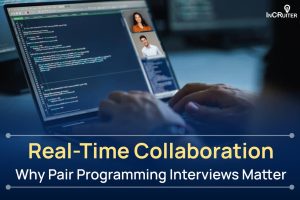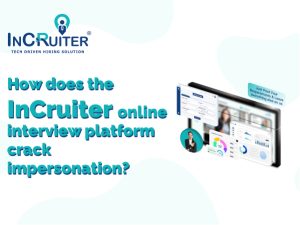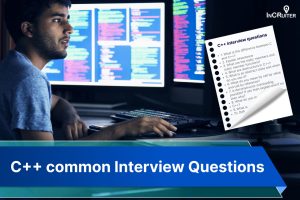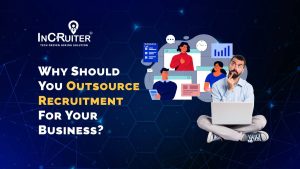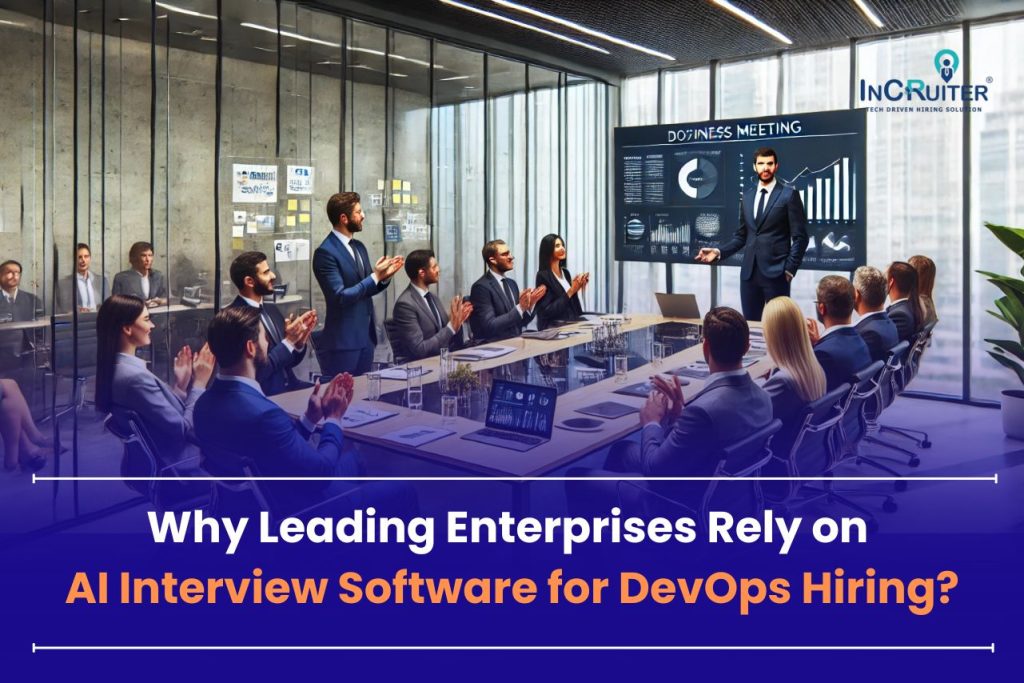
If shipping code faster is a race, DevOps engineers are the pit crew and leading companies like Fortune 500s can’t afford a slow lane. These companies deploy across multiple environments, demand zero downtime, and expect speed without sacrificing security. That’s why DevOps roles are mission-critical. But here’s the catch: LinkedIn reported over 22,000 DevOps job postings per month in India alone last year, so the talent pool is competitive, and time is tight. To stay ahead, enterprises are ditching outdated interview cycles for AI interview software.
In this blog, we’ll dive into how AI interview software redefines DevOps recruitment at an enterprise scale.
Common Hiring Problems Enterprises Face
Skill Verification Takes Too Much Time
Hiring for DevOps is not as simple as checking if someone can write code. It involves many things like handling cloud tools, automating deployments, and keeping systems running smoothly. Just reading a resume or asking a few questions will not help you find out if someone knows how to work with platforms like Docker, Kubernetes, or Jenkins. Many hiring managers say checking these skills properly is one of the toughest parts of the job. If the screening is not deep enough, the wrong people get selected. That leads to slower progress, more bugs, and frustrated teams. Companies need faster ways to check real knowledge before it affects the work.
No Common Method of Testing Skills
Every team seems to use a different way to test DevOps candidates. One group might stick to asking theory questions. Another might use test sheets from years ago. Some even depend only on certificates. This leads to mixed results. One candidate might pass with flying colors in one department and fail completely in another. It becomes unfair and confusing for everyone involved. When big companies use scattered methods across teams or offices, hiring becomes messy. It takes longer, and the quality drops. Without a clear and common structure, it is hard to know who really fits the job well.
Long Hiring Process Scares People Away
Good DevOps experts are always being approached by companies. They do not wait around if the process takes too long. The moment they see too many interview rounds or slow replies, they leave and accept other offers. This is not just a guess. Many surveys show that most developers stop talking to a company if it delays decisions. In DevOps, where being fast and accurate matters a lot, waiting even a few days can cause delays in business. If hiring takes too long, projects get stuck. To grab the best people, companies must act quickly and avoid wasting time.
Teams Get Pulled Away From Work
Tech teams already have a lot on their plate. They are busy fixing problems, keeping systems alive, and planning for future work. When these engineers are also asked to sit for interviews again and again, their main tasks suffer. Many team leads say they lose a big chunk of their week just to interview people when hiring picks up. This affects project work and slows everything down. Interviewing also gets tiring when done too often, which can lead to careless judgments. To keep things running well, companies must look for smart tools that help in hiring without pulling teams off their core work.
Also Read: Blogs of Ai Interview
How AI Interview Software fix this problem?
Real Skill Testing With Auto-Generated Questions
Most of the time, when DevOps engineers are screened using old methods, the test doesn’t match what the real job looks like. Many tests focus too much on bookish knowledge. But AI interview software does things differently. It picks questions based on what the job needs. The system checks the job title, required skills, and experience level, then generates the questions or tasks that fit.
For example, someone who has worked for a few years in DevOps might be asked to talk about how to fix pipeline issues or handle containers with tools like Docker or Kubernetes. These are tasks they would face at work. Recruiters no longer need to think hard about what to ask. The tool takes care of it and makes sure that only the right topics are covered. This saves hours of manual effort and gives a better look at how well a person can handle actual work situations.
Structured Evaluation Through Conversational AI
When companies hire many people across different places, keeping the process fair for everyone becomes hard. Some interviews are too light, some too tough. But when the tool uses chat-based smart tech, i.e., Conversational AI, it brings a balanced way of asking questions. It starts with a fundamental question and listens carefully to what the person says. If the answer is good, it moves forward with more questions based on that reply. It feels like talking to a human, but it is all handled by the software.
It checks how well someone knows tools, how they think, and how they solve problems. The best part is that every candidate gets the same interview style. No one gets lucky or unlucky, depending on who takes the interview. Big companies love this because it helps them hire faster while keeping things fair, deep, and steady across all roles.
Interview Flexibility to Reduce Candidate Dropouts
Many companies often chase people working in DevOps. They get several job calls and barely have time to wait around for interviews. When the process gets delayed, many of them drop off or stop replying. This leads to missing out on skilled people. Smart interview tools help fix this with one-way video interviews. Whether a recruiter wants to send one link or invite hundreds of candidates simultaneously, it can be done quickly without the stress of scheduling interviews.
Candidates can log in whenever they’re free, watch the questions, and record their answers on the spot. There’s no need to match calendars or fix time slots. It saves both sides from long waits. For employers, this means faster responses and fewer no-shows. It also makes it easy to hire from any part of the country or world. Everything moves quicker, and the candidate feels more relaxed and included.
Better Skill Testing With Coding Assessment Platform
The tools also come with code-testing sections. These are made to check real DevOps tasks. Instead of solving logic puzzles, candidates are asked to write code that matters in daily work. For example, they may be told to build a script for automation, fix a broken setup, or connect two systems. The tool checks if the answer is correct, clean, and makes sense. It gives scores right away and shows how the candidate performed.
According to HR Brew, 61 percent of recruitment and technology leaders already use one-way video tools, often combined with coding assessment platforms. This helps recruiters know who is ready for the job and who is not. No guesswork is needed. The team does not have to spend time checking each answer. For companies that hire many people, this makes things easy. It helps filter out weak profiles early and ensures strong candidates are moved forward. It also saves time for engineers who are usually busy and should not be doing first round interviews.
Why Fortune 500s Prefer AI Interview Tools?
Supports Enterprise Grade Compliance and Audit Trails
Large organizations must follow strict data protection and compliance frameworks such as SOC 2 and GDPR. AI interview platforms maintain detailed activity logs, question flows, candidate interactions, and assessment outcomes. These records make it easier for compliance teams to perform internal audits or respond to external reviews without friction. Everything from who conducted the interview to how a decision was made is traceable. This transparency helps Fortune 500s reduce legal risks, ensure ethical hiring practices, and align recruitment operations with corporate governance policies across every region they operate in.
Enables Hiring at a Global Scale with Localization
For companies with a worldwide presence, hiring across regions involves more than just managing different time zones. It requires adjusting to local languages, cultural expectations, and compliance rules while keeping the hiring process consistent. AI interview co-pilot platforms support this by offering multilingual interviews, role-based question sets, and workflows that align with regional hiring practices. Whether recruiting in Germany, India, or the United States, the platform respects local differences without compromising company-wide standards. This allows Fortune 500 companies to deliver a smooth and personalized candidate experience across borders using one intelligent and unified system.
Improves Employer Branding with Tech Forward Experience
First impressions matter in hiring. When top talent encounters outdated or manual processes, it reflects poorly on the company. AI interview tools create a modern, seamless experience that aligns with how enterprise brands present themselves. From branded interview interfaces to instant evaluations, candidates feel they are engaging with a tech-enabled organization. This improves employer branding, especially in competitive industries where innovation and speed are top priorities. Fortune 500s use these tools for efficiency and to reinforce their position as leaders who invest in more innovative, future-ready recruitment strategies.
Boosts Predictive Hiring With Longitudinal Data
AI platforms collect and process vast amounts of hiring data over time. From candidate behavior during interviews to patterns in successful hires, the system continuously learns what works. Enterprise HR teams can then use this insight to predict which candidates are more likely to perform well, stay longer, or align with company values. This is especially helpful in large-scale hiring, where intuition is not enough. Fortune 500s gain a strategic edge by turning raw candidate interactions into data-driven decisions, improving hiring outcomes with every cycle.
Seamlessly Integrates With Existing Enterprise Systems
Enterprises Hiring rely on many tools, including applicant tracking systems, customer relationship software, calendar platforms, and internal dashboards. AI interview tools are designed to connect with these existing systems effortlessly. This allows hiring teams to avoid working in silos or manually moving data across platforms. Whether pushing candidate results into a recruitment pipeline or syncing interview schedules, everything flows through one connected ecosystem. Fortune 500 companies prefer tools that fit within their tech infrastructure instead of forcing a separate workflow, ensuring smooth hiring processes without additional overhead.
Reduces Internal Bias Through Algorithmic Fairness Tuning
Bias in hiring is often unintentional but still harmful. AI interview platforms allow organizations to build fairness into their evaluation logic. These systems can anonymize specific candidate data, balance question exposure, or reduce reliance on voice or visual cues that may trigger unconscious bias. Advanced platforms offer feedback loops to regularly update their fairness models based on performance and diversity benchmarks. Fortune 500s use these capabilities to support inclusion, create equitable hiring practices, and meet internal diversity goals. Bias reduction is not just ethical; it is also a good business strategy.
Also Read: Top 10 Best AI interview Software for Hiring in 2026
How AI Interview Software Work?
1. Recruiter sets up the job role
The process begins when the recruiter adds essential details such as the job title, experience level, required skills, and responsibilities. This information helps the AI understand what type of candidate is needed. The recruiter can also choose specific competencies to assess. These inputs are the foundation for creating a focused and relevant interview experience that aligns with the job role and the company’s hiring goals.
2. Candidate profiles are added to the platform
Once the job is created, candidate profiles are uploaded into the platform. This can be done manually or in bulk through spreadsheets or integration with applicant tracking systems. Each profile includes basic information like name, email, experience, and role applied for. This step ensures that the platform can track each candidate’s progress, generate interview links, and personalize the evaluation process based on the job role they are mapped to.
3. The system creates a tailored interview
The platform designs a customized interview using the job role and candidate data. It includes technical questions, behavioral scenarios, and smart follow-ups tailored to the role. The tool ensures the questions align with job demands and complexity. This helps evaluate both hard and soft skills without bias. The system also ensures that every candidate receives the same level of challenge, maintaining consistency across different locations and departments.
4. Candidates receive a secure interview link
The platform automatically generates individual interview links for each candidate. These are shared via email or SMS, allowing candidates to access their interviews from anywhere at any time. There is no need to schedule live meetings or sync calendars, which helps reduce delays and encourage faster participation. The link remains secure and valid for a fixed period, allowing candidates to complete the interview within a comfortable window.
5. Interview is conducted using conversational AI
When candidates begin their interviews, the platform interacts with them using a conversational format. It asks questions one by one, listens to responses, and adapts follow up questions accordingly. This makes the experience feel more natural than a traditional test. The AI mimics a real interviewer, providing a dynamic environment while collecting detailed input. It can handle multiple question types, from scenario based to technical, allowing a deeper understanding of the candidate’s ability.
6. Monitoring tools ensure interview integrity
To ensure fairness and authenticity, the platform uses monitoring features such as screen activity tracking, tab switch detection, and camera monitoring. These tools help confirm that the candidate is completing the interview without outside assistance. For sensitive roles or high-stakes hiring, this step is critical. It gives recruiters confidence that the results are genuine and reliable. Some platforms also include environmental sound detection and facial recognition for additional security.
7. A detailed report is automatically generated
Once the interview ends, the system processes the responses and creates a report for the recruiter. The report highlights key metrics such as communication clarity, technical accuracy, logical thinking, and behavioral fit. It often includes AI scored answers, summary charts, and recommended actions. This saves the recruiter hours of manual review. The report is easy to read and structured to help identify the most suitable candidates for the next steps.
8. Recruiters review insights and take action
With the report in hand, recruiters can easily shortlist, reject, or move candidates forward based on objective data. They can also compare performance across candidates to make stronger hiring decisions. The platform allows collaboration among hiring managers, feedback sharing, and integration with internal systems. This step keeps the hiring process smooth, efficient, and aligned with timelines. It reduces bias, improves speed, and helps companies secure the right talent with less effort.
Conclusion
Fortune 500 companies know that hiring DevOps talent isn’t just about filling roles it’s about accelerating growth. With AI interview software, they’re achieving faster, more accurate hiring, reducing bias, and aligning candidates with evolving infrastructure needs. These tools adapt alongside emerging DevOps trends, helping enterprises stay agile in competitive markets. By streamlining evaluations and scaling smarter, organizations are building stronger tech foundations without slowing down. The result? Quicker deployments, better performance, and a future-ready workforce are all driven by smarter hiring decisions.
Streamline your DevOps hiring with the InCruiter AI Interview Platform, built for speed, precision, and scale.
Ready to Transform Your Hiring Process?
Discover how our AI-powered interview platform can streamline your recruitment and find the best candidates faster.

